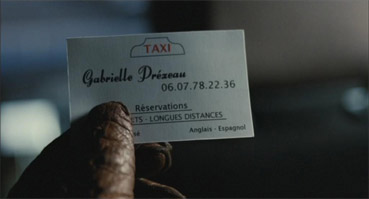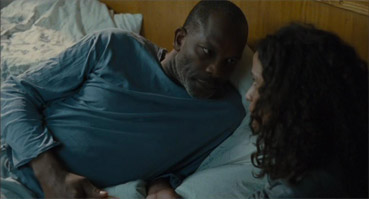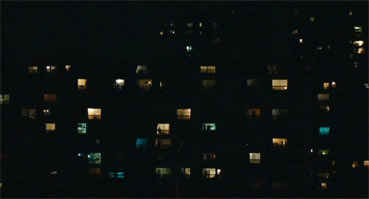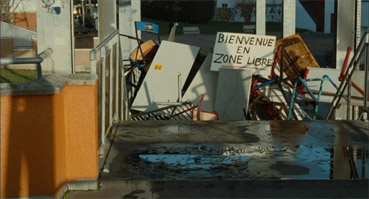"We have everything here. Why go looking elsewhere?" |
Lionel |
Have you ever passed a tower block and pondered over the people who live inside? Or perhaps you've found yourself wondering about the relationships between the people you happen to catch in the midst of either coming from or going to somewhere? Maybe I'm just too curious for my own good or I have far too much time on my hands, but I've always considered apartment blocks to be something of a social microcosm. The concrete monoliths that pierce our skylines the world over allow us to live surrounded by possibly hundreds of people and yet live by entirely by ourselves. Save for the daily crossing of paths in the communal spaces of people live together, crossing paths in the communal spaces of staircases and lifts, once we turn our keys in the door, we're very much alone. The building that looked like a giant has suddenly downsized to Thumbelina. Those so curiously inclined will find their answer – and possibly leave you with many more questions into the bargain – in Claire Denis' nineteenth film, 35 rhums/35 Shots of Rum.

This interplay between the public wide-open spaces of the city and the intimate, intense and sometimes claustrophobic private space of the home is the heart this film. Set in a tower block on the outskirts of Paris, we encounter a small group of interconnected characters: widowed train driver Lionel (Alex Descas), his university student daughter Joséphine (Mati Diop), and their neighbours, close friend Gabrielle, a city taxi driver (Nicole Dogué) and the mysterious Noé (Grégoire Colin), who romances Joséphine, eager to travel and make a life himself. As the story of their day-to-day lives unfolds, Lionel and Joséphine's bond is tested and he struggles to struggles to accept that his daughter wants to find her own path, living her life her own way, beyond the confines of their apartment.
If that sounds something of a vague summation of events, that's because things are hard to pin down, but far from being a criticism of Denis' film it's an endorsement. All too often, films become mired by exposition and the need to tell their audience everything, Never has the phrase "watch and you'll find out," been more appropriate. Like her previous work, we enter this film well after the beginning of these characters lives, where the connections between them have already been established, and in some cases severed, before we arrive. This film is a window into their lives that gives us glimpses of what happens to them every day, but it's not an entirely clear picture. There are jumps in time and space – though quite different to the film as memory structure of her Denis' debut feature, Chocolat/Chocolate – which give the film something of a fragmented feel, making for a challenging viewing experience if less accustomed to non-linear narrative structures. Despite this, the film as a whole feels strangely cohesive. In fact, when 35 Shots ends; you're likely to be compelled to watch the whole thing again from the beginning, just to see if you can pick up anything you missed.
35 Shots is a film that revels in the ordinary, in the minutia of everyday life, the patterns and the rhythms that make us who we are: the comfort Lionel draws from driving along the same train route knowing the track will never deviate; Joséphine's lectures and shifts at the record shop; Gabrielle's taxi fares; Noé's impromptu travelling expeditions; parties, concerts and coffee dates. We're left to work everything in between, whether it's all that came before or all that will follow.

The shot compositions constantly shift from the widest of angles, showing the exterior of the tower block lit up like a Christmas tree at night time to the closest, as we watch Lionel prepare food in the kitchen steamer. The approach to pacing means we notice much more, we're allowed to look and see these tiny details, to inquire and search and to considering shape and space. Denis and long-time collaborator Agnès Godard not only show us these people living, but truly show us how they live; during moments of happiness and sadness. Denis captures the silences as well as the words her characters say, and are often much more important. The close-up is so often used as something of a lazy shortcut to express emotion, but in Denis' films more than any other they fulfil that need completely, and honestly. The faces of these actors are so magnetic, so intriguing and so open it sometimes feels as if we're intruding by continuing to watch them.
Everything here has a delicate balance, one that is never disrupted.
As with the rest of Denis' considerable body of work, you get out what you put in. If you choose to actively engage with her film, and try to interpret the visual enigma she places before us, then your experience of it will be markedly different to that of a person who is a passive viewer. This, more than any of her films – perhaps with the exception if the exercise in minimalism that is Vendredi Soir/Friday Night – needs to be viewed with an open mind. Of course, it's also true that the more you want to see the presence of certain themes and ideas – freedom versus oppression; desire and self-control; wealth and poverty – the more you will find. However, there are few filmmakers who can stand up so well to the rigors of scrutiny like this director can. Seeming to feed off of such a reputation, Denis never offers us explanations or finite meanings to any of the events within the film. In a way, it's our own quest to put all the pieces together, and see if we arrive at the same completed puzzle that the director envisages.
A particular case in point comes in the form of the nature of the film's central relationship between Lionel and his daughter Joséphine. Denis plays with the social and moral implications of exactly what form this takes from the very beginning. Until Joséphine addresses Lionel as her father when thanking him during the family meal, we're unaware what their connection is. Up until that point, it's perfectly plausible to believe that they could be in a romantic relationship. Depending on what you choose to believe from there on in, the close bond between Lionel and Joséphine could be seen as an incestuous one. At times, he acts just like a jealous lover; constantly watching her every move when she's is given romantic attention by Noé and her fellow classmate Reben (Jean-Christophe Folly). However, those same reactions could simply be symptomatic of an overbearing father, whose strong feelings are borne from a lifetime of struggling to bring up his daughter alone – though it's implied Gabrielle has helped him over the years – terrified of what will become of her when he finally has to let her go out into the world.

Her eye for detail is less concerned with the French nation as a whole and more concerned with the plight of the individual. There are moments in this film which are entirely concerned with the character's perception of self and their own identity, as well as their struggle to define it and themselves on their own terms – in essence, taking control of their own lives. This is a recurrent theme of Denis work, whether within the militaristic confines of Beau Travail/ Good Work or the colonialist oppression of Chocolat.
35 Shots is about the human condition, how people connect together, how we respond to those connections and the emotions which arise from them. These responses shift and change over time, just as we shift and change as people. Ultimately doesn't really matter how we interpret events on screen, since there is no definite answer. However, But, what does matter is that we make our own connections with the film, whether this is from social, moral or emotional perspective. This film sees Denis at her detailed and complex best. Sometimes confusing, some beguiling, but always interesting and most definitely challenging, Denis' cinema is one that speaks to the heart, the mind and the soul, crafted for senses beyond what's captured by the eye.
Though some have suggested that this is Denis working in a lower, quieter tone, I don't believe this is the case, since her films could hardly ever be described as loud, bold or brash; they are the underscore rather than the overture, and this film is by no means less effective or affecting because of such a distinction.
A clean, crisp anamorphic 1.85:1 transfer that shines in all lighting conditions, with dusk an the early light of morning particularly well caught. Even darker scenes such as train interiors at night are free of compression artefacts and noise. Colours appear true and are subtly used and not excessively manipulated, as is the present norm. Contrast is well judged, a touch strong at times but hangs on to the shadow detail – at it's best this is a very nice transfer.

The Dolby stereo 2.0 and surround 5.1 tracks score equally on clarity and there's not enough going on in the surrounds to give the 5.1 a serious edge, though rainfall sounds particulrly good here. The music is also more subtly inclusive here.
Trailer (1:37)
This is paced to fit the strong instrumental tracks throughout, each reflecting a change in tone. Rather than relying solely on music, there are also some key scenes subtitled, which is nice to see, and certainly gives enough detail of the film's main themes without being overlong.
Interview with Claire Denis (20:56)
Conducted by critic Jonathan Romney for the French film channel Cinemoi, this is termed by the opening titles as a conversation – since it lacks the audience participation or immediacy of a Q and A session – but it's much more structured, like a press junket (complete with poster/advertisement in the background), but with higher production values. Each segment is followed by a short except from the film, and appears to be organised thematically.
Denis is typically introspective, and her answers seem rather more philosophical and less defined – though not lacking detail – than the cool, detailed and dare I say over-analytical questions that precede them. Placing the amusing observations regarding interview technique and the idiosyncrasies of the British reserve versus French artistic flamboyance aside, this is most definitely worth watching, because it's quite different to the run-of-the-mill promotional, and is focused more on Denis' thoughts on cinema, her approach to filmmaking and signature aesthetic. This feature reveals as much about the artist as it does about her art.
35 Shots of Rum is a subtle and intimate family drama, that's delicately crafted and superbly executed. If the honest and nuanced performances of Denis' cast don't stay with you, then Agnès Godard's stunning visuals surely will. This is arthouse at it's best, with a distinct style that may not be to everyone's taste, but for fans of Denis' work will not come away disappointed, since there's a great deal to enjoy here. Like all the best things, the value of this film will surely appreciate over time. Highly recommended.
|